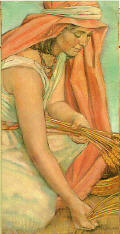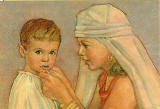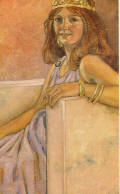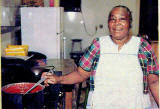Women in Ministry: Women of Faith: Yesterday, Now and Forever
“God is not ashamed to be called their God.” This profound statement is found in Hebrews 11, the faith chapter of the Bible. Can you imagine your name being listed along with Noah, Abraham, Isaac, Joseph and Moses in God’s list of the faithful?
But before we go any further, let’s look at that list a little more closely. Faith is not only a masculine virtue. Sarah and Rahab and the women who received their dead raised to life again are also listed. And those courageous nameless people who “were tortured, not accepting deliverance.”
Let us take a new look at faith—from the point of view of women. Let us see how women of the Bible also used faith in their walk with God.
God’s choice
Deborah, the only recorded female judge of ancient Israel, is described in Judges 4 and 5 as the deliverer of Israel for 40 years from Canaanite oppression. Before we analyze how this extraordinary woman did this, think about what it might take for a female to become the spiritual, judicial and military leader of Israel. It was a time of anarchy. The Hebrew tribes had settled among the Canaanites and began to worship their gods. Israel failed to stand apart from its pagan neighbors, as God commanded them. Instead of being righteous examples to the surrounding cultures, they took part in customs loathsome to their God.
Though God made it plain that both mothers and fathers—women and men—are to be treated with equal respect (Exodus 20:12), in this degenerate disunited society, the rights of women were often overlooked. Women today complain about rights, but what do you think it took for a woman of that age to achieve what Deborah did? It took one major ingredient—a strong belief and faith in God.
God chose a faithful woman as Israel’s judge and prophetess. It was a woman who encouraged Barak, the son of Abinoam, to heed God’s call to duty and lead Israel’s army against Sisera’s 900 iron chariots. It was a woman who accompanied the troops to the battleground at Mount Tabor to fortify Barak’s wavering courage (Judges 4:8-9).
To be fair to Barak, when he looked at the odds against him, he clearly saw that unless God was on Israel’s side, he and his troops would be massacred. Being a practical man, he made sure God’s prophetess would be at the battle scene to provide divine insight. Barak is also on God’s list of the faithful (Hebrews 11:32).
Deborah knew, in spite of the circumstances of her time and culture, that in God’s sight, women were not second-class citizens, that God was not a respecter of persons. Her strong abiding faith gave this woman the conviction and courage to allow God to use her in a most unusual way.
How satisfying it must have been for Deborah to look down on the Plain of Megiddo, 20 miles of battleground, and see God miraculously deliver Israel’s army. “So let all your enemies perish, O Lord,” was Deborah’s battle cry. You can read in Judges 5 a stirring description of ancient Israel’s deliverance from Sisera’s oppression.
|
Rahab saves her family
Back even before the time of Deborah and Barak, let’s look at another remarkable Old Testament example of feminine faith— that of the innkeeper Rabab. Some scholars believe she (like most female innkeepers) was a harlot, others deny the possibility. But one thing we do know: she is the only woman other than Sarah who is listed by name in God’s account of his faithful in Hebrews.
Rahab lived in the age-old city of Jericho during the time that Joshua was leading the Israelites out of the desert into the promised land. According to archaeologists, a double wall of brick protected the city. Rahab’s house was probably built over the 12-to-15-foot space that separated Jericho’s 12-foot-thick inner wall from its 6-foot-thick outer wall.
The city of Jericho was the most important city in the Jordan Valley. The Canaanites of Rahab’s time excelled in the arts and sciences. Morally, however, they were perverse. Their pagan religions were lewd and base, their civilization was decadent. Even though Jericho was heavily fortified, the Canaanite inhabitants of Jericho were understandably nervous about the Israelite hordes camped close by on the plains of Moab.
As they walked toward Jericho, two Hebrew spies sent by Joshua, Israel’s military leader, may have noticed Rahab’s house, with its window on the side of the massive outer wall of the city. When they entered the city, they were no doubt pleased to learn that this particular house on the wall was a place where two strangers would be accepted.
Rahab had heard about the miracles God had performed to rescue Israel from the Egyptians. She knew that the Amorites across the Jordan had been conquered. When the Israelite spies came to her house, she seized on the chance to save her family from what she saw as certain destruction.
Her neighbors had heard the stories, too. But, unlike her, they trusted in the thick walls of Jericho. Somehow, out of all these people, Rahab could see beyond the brick and stone of her familiar world and trust in the Hebrews’ God. It must have been difficult to decide to forsake all that she knew and was comfortable with.
Following the spies’ instruction, she acted on her faith and marked her home with a sign—a red rope. God respected her trust in him, and she and her family were spared when Jericho’s walls fell. One woman of faith out of a whole city. You can read the account of Rahab’s deliverance in Joshua 2-6.
Jesus and women
Jesus Christ constantly surprised his followers by the way he treated women. Women were real people to Jesus. Ignoring local custom, Jesus expected women as well as men to listen to and follow his teachings. Remember the account of Jesus’ gentle rebuke of Martha for criticizing her sister Mary because she chose to listen to Jesus rather than help serve the male guests?
“And Jesus answered and said unto her, Martha, Martha, you are careful and troubled about many things: But one thing is needful, and Mary has chosen that good part, which shall not be taken away from her” (Luke 10:41-42).
Jesus revealed the marvelous truth of his messiahship to, of all people, a Samaritan woman (John 4:21-26). The Jews despised the Samaritans and their religion. For a Jewish man to speak to a woman in public, especially a Samaritan woman, was unheard of at the time. Jesus’ disciples were astonished when they saw him so at ease with women, talking to them, teaching them and admonishing them, as he did men. Women were amazed as well—and appreciated his concern for them, expressed so openly.
Unrecorded heroes
The multiple hundreds of thousands of women of faith over the centuries go unrecorded for the most part. Whatever our backgrounds, wherever we live, we all, no doubt, have our personal Joan of Arcs to add to the list.
About 100 years ago, women weren’t satisfied with the world they saw around them and began to complain. Women campaigned against war, alcoholism, long work hours, low wages, child labor, high infant death rate, and filthy living conditions.
In the United States in 1909, Nannie Helen Burroughs gave her National Training School for Women and Girls in Washington, D.C., the motto: “We Specialize in the Wholly Impossible.” The National Training School, a model for many others, “offered young African American women a liberal-arts education and more….
“Mary Breckenridge of the Frontier Nursing Service sent nurse midwives riding on horseback through the woods of Kentucky in the 1920s. Jane Addams founded Chicago’s Hull House, one of the first and most important of the establishments of the settlement house movement, and won the Nobel Peace Prize in 1931” (“Smithsonian News Service,” Mary Combs).
Edie Mayo, curator in the Division of Political History at the Smithsonian’s National Museum of American History in Washington, D.C., adds, “What is truly astonishing is the fact that they accomplished most of it without the power to vote.”
These few and far between examples from the past are fine, you may think, but what about now? Can today’s women expect God to answer their prayers? Can they have faith? Does God discriminate against women today?
God is no respecter of persons (Acts 10:34-35). He expects women, as well as men, to faithfully believe in him. “There is neither Jew nor Greek, there is neither slave nor free, there is neither male nor female; for you are all one in Christ Jesus” (Galatians 3:28, New King James). God expects both men and women to actively express that faith by following him.
Why is active faith in God so important? To answer that question, we must first understand what faith is— and what it isn’t.
Faith is…
Here’s one definition of faith: “Faith is the substance of things hoped for, the evidence of things not seen” (Hebrews 11:1). Faith is absolute confidence in God’s will, God’s purpose, and absolute belief that God through his Son Jesus Christ will answer your prayers –all this before you see any physical proof.
Deborah knew before she called for Barak that God would grant Israel the victory. But how? Everything she could see and hear seemed to point toward Israel’s defeat. Sisera had 900 chariots; he had thousands of well-trained and well-armed troops. Barak had neither. From what could be physically detected, it was not logical (in human terms) for Deborah to expect to win. But Deborah had faith in God, and knew that he would help Israel overpower the mighty Canaanites.
Deborah’s faith was not an emotion. It wasn’t some kind of feeling she had worked up over several hours or days. Her faith was not just hope, either. Wishful thinking does not win battles against iron-tipped chariots and battle-hardened troops.
Deborah’s faith was the unwavering belief in the face of overwhelming odds that God exists and that he will do what he promises he will. This faith is based on experience of what God has done, knowing he will not change his great purpose for humans. It is the kind of faith that wins wars and, in Rahab’s case, saves lives.
The kind of faith that leads us to believe in and obey God is the only kind that pleases him. “But without faith it is impossible to please Him, for he who comes to God must believe that He is, and that He is a rewarder of those who diligently seek Him” (Hebrews 11:6, New King James).
Those who believe don’t let circumstances cause them to doubt God. And God answers their prayers. “But let him ask in faith, nothing wavering. For he that wavers is like a wave of the sea driven with the wind and tossed. For let not that man think that he shall receive any thing of the Lord” (James 1:6-7).
Is faith out-of-date?
How strong is your faith? Can God look down at you as one he could add to his list of faithful servants? Or does faith seem to be an old-fashioned virtue, not as necessary in our modem technological world? Jesus wondered whether in the latter days of our civilization faith would be a scarce commodity. “Nevertheless when the Son of man comes, shall he find faith on the earth?” (Luke 18:8).
Does having faith still matter? Yes, it certainly does. The gift of faith—true godly faith—is needed for our salvation. “For by grace you have been saved through faith, and that not of yourselves; it is the gift of God” (Ephesians 2:8, New King James). To learn more about this kind of faith, click here.
God does not discriminate. Whether Abraham or Sarah, Barak or Deborah, Hebrews says that the world was not worthy of those faithful people. Male or female, let’s be sure we have the faith to make his list as well.
Sheila Graham
|
Author: Sheila Graham

 May You Be Like Ruth…
May You Be Like Ruth… Hannah’s Gift
Hannah’s Gift A Queen Risks Her Life
A Queen Risks Her Life